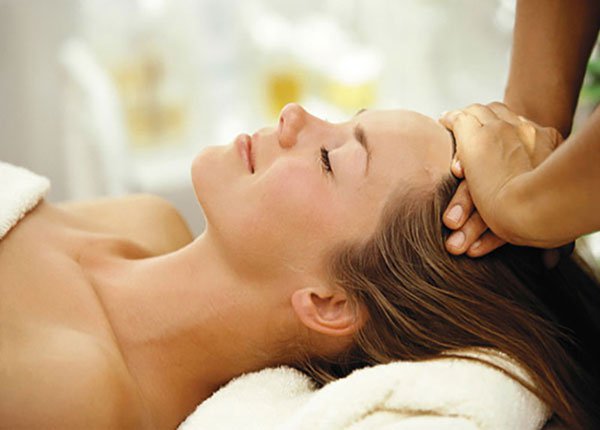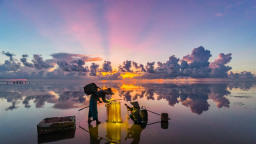The Investor holds workshop on wellness-based real estate trends
A workshop organized Tuesday by The Investor on real estate trends catering to increasing demand for wellness-based living seeks to locate Vietnam on this lifestyle’s world map.

Tourist destinations with standard healthcare facilities in Vietnam have lured significant investments. Photo courtesy of Vingroup
The event in Hanoi will discuss international trends as new investment opportunities, get an insight into the case of Vietnam, and propose solutions appropriate for the country.
Among the participants at the morning event will be representatives from the ministries of Culture, Sports and Tourism, Health, Natural Resources and Environment, and Construction, as also economists and representatives of Vietnamese and foreign companies.
The context for the workshop is the undeniable impact that the Covid-19 pandemic has had on people’s lifestyle, needs and behavior, resulting in major changes in the real estate and tourism sectors.
One of the changes is discernible investment flows towards real estate projects that focus on wellness-based lifestyles.
The Global Wellness Institute (GWI) has evaluated the world’s wellness economy at about $4.4 trillion in 2020 and estimated it will reach $7 trillion by 2025.
Wellness tourism value alone reached $617 billion and $720 billion in 2017 and 2019, respectively. This is predicted to increase to $816.5 billion this year and to more than $1,127 billion in 2025, with a likely average growth of 20.9% per annum.
Vietnam fits easily into this global development trend, given its long coastline, many scenic spots, cultural and historical relics, not to mention its rich cultural heritage. The nation’s traditional medicine sector and many systems of hot mineral springs are particular advantages.
The Vietnamese government encourages the provision of healthcare services to tourists based on traditional and modern medicine towards improving their physical and mental health.
In recent years, tourist destinations with standard healthcare facilities have lured significant investments. These include Kim Boi (Hoa Binh province), Sapa (Lao Cai), Hoi An (Quang Nam), Nha Trang (Khanh Hoa), and Sun Group’s resorts in Quang Ninh province and Phu Quoc Island. Urban areas like NovaWorld Phan Thiet in Binh Thuan and Hanoi’s Ecopark are also known as destinations promoting wellness-based lifestyles.
However, specialists say that this sector has not been able to provide diversified products and services as expected. The most popular wellness attractions are mostly spas and hot mineral water baths.
Experts believe that there are several reasons for this. First, the sector is still a new concept and as such, lacks clear definitions, development orientations, criteria and standards.
The wellness-based lifestyle is understood often as health tourism with spas, mineral water baths, mud baths, yoga and meditation.
Second, there is no overall policy orientation for land planning, investment incentives, registration and other procedures. Coordination between the tourism, healthcare, and sports sectors is also limited.
Third, limited capital has left several projects in this sector unfinished or operating inefficiently.
Fourth, the sector is hampered by the lack of strong, professional workforce.
Fifth, marketing and promotion campaigns both within and outside the country for highlighting wellness-based lifestyle options have been limited.
- Read More
Vietnamese agri major Loc Troi’s predicament ahead of partnership with TTC AgriS
TTC AgriS, a leading sugar maker in Vietnam, and Loc Troi Group, a major agricultural service supplier and producer, have agreed to cooperate in a bid to upgrade the country’s rice industry. But Loc Troi is entering the partnership amid the most severe crisis in its history and faces an urgent need for substantial financial support.
Companies - Thu, December 25, 2025 | 8:37 am GMT+7
Korean textile maker Panko Vina to shut Vietnam operations from Feb
Panko Vina Co Ltd, a South Korean textile manufacturer, will cease all production and business operations in Vietnam from February 1, 2026, ending more than 23 years of operations in the country.
Companies - Wed, December 24, 2025 | 9:13 pm GMT+7
Vietnam's garment giant Vinatex posts second-highest profit in 30 years despite trade headwinds
Vietnam National Textile and Garment Group (Vinatex), the country's top garment maker, expects consolidated profit to reach VND1,355 billion ($51.5 million) in 2025, the second-highest result in its 30-year history, despite mounting global trade and cost pressures on the industry.
Companies - Wed, December 24, 2025 | 5:03 pm GMT+7
Finding a new balance
The State Bank of Vietnam's proactive and flexible monetary policy in 2026 is expected to maintain market operations within a stable range. For businesses, particularly those in the external sector, it remains essential to proactively hedge against exchange rate and interest rate risks to protect their bottom line, writes Vu Binh Minh, associate director, FX Trading, MSS, HSBC Vietnam.
Consulting - Wed, December 24, 2025 | 4:47 pm GMT+7
Thai giant Central Retail sells Vietnam electronics business to Pico for $36 mln
Thailand’s Central Retail has announced the sale of its Vietnamese electronics retail business to local retailer Pico Holdings JSC for nearly THB1.14 billion ($36 million), as it sharpens its focus on core businesses in the country.
Companies - Wed, December 24, 2025 | 2:00 pm GMT+7
What should investors reasonably expect from IPO stocks?
Experience from both Vietnam and global markets shows that initial public offering (IPO) stocks rarely deliver immediate gains. However, investors who select companies with solid fundamentals and maintain a long-term holding strategy can be rewarded for their patience.
Finance - Wed, December 24, 2025 | 10:45 am GMT+7
Vingroup completes $325 mln overseas bond issuance
Vingroup, Vietnam's biggest listed company by market capitalization, has completed its international issuance of bonds totaling $325 million, with a 5-year maturity, and listed on Austria's Vienna Stock Exchange.
Finance - Wed, December 24, 2025 | 10:17 am GMT+7
Vietnam's public investment-linked stocks seen benefiting in 2026
Capital flows in 2026 are expected to favor sectors that stand to benefit from Vietnam’s public investment drive, including infrastructure, energy, and construction, market experts said.
Finance - Wed, December 24, 2025 | 9:33 am GMT+7
High gold prices to drive prices of property, goods in Vietnam: Sunhouse chairman
In a scenario where gold prices remain elevated in Vietnam, the real estate market is likely to follow suit, pushing income levels higher and driving up prices across other goods, said Nguyen Xuan Phu, chairman of Sunhouse, a leading home appliance manufacturer, while outlining his 2026-2030 forecast.
Economy - Wed, December 24, 2025 | 8:00 am GMT+7
Malaysia’s economy grows robustly in 2025: IMF
Malaysia has shown notable resilience amid global trade tensions and policy uncertainty, with its economy growing at a healthy pace this year, supported by strong domestic consumption and investment, solid employment growth, and a global upcycle in the technology sector, according to Masahiro Nozaki, Mission Chief for Malaysia at the International Monetary Fund (IMF).
Southeast Asia - Tue, December 23, 2025 | 10:07 pm GMT+7
Indonesia to stop rice imports next year
Indonesia will not import rice for either consumption or industrial use next year, citing sufficient domestic production, according to a government official.
Southeast Asia - Tue, December 23, 2025 | 10:04 pm GMT+7
Indonesia faces challenge of balancing wages, labor costs
Indonesia plans to raise minimum wages by about 5-7% in 2026 under a new formula signed into law by President Prabowo Subianto, a move that could test the country’s cost competitiveness in Southeast Asia.
Southeast Asia - Tue, December 23, 2025 | 10:00 pm GMT+7
Philippines extends sugar import ban
The Philippine Government has decided to extend its ban on sugar imports until the end of December 2026, as domestic supply has improved.
Southeast Asia - Tue, December 23, 2025 | 9:56 pm GMT+7
Duc Giang Chemical stock comes under heavy selling pressure as bottom-fishing shares return
DGC shares of Duc Giang Chemical Group JSC (DGC) closed Tuesday at VND71,600 apiece, down 4% from Monday which saw a 6.27% increase after four sessions of sharp declines last week.
Companies - Tue, December 23, 2025 | 9:49 pm GMT+7
Hanoi clears zoning for major mall project after Aeon exit, Thaco arm steps in
Hanoi authorities have approved a detailed zoning plan for an 8.03-hectare mixed-use site in Hoang Mai district, paving the way for a shopping mall-led development after Japan’s Aeon withdrew and a unit of Vietnam’s Thaco Group moved in.
Real Estate - Tue, December 23, 2025 | 5:05 pm GMT+7
Viettel Commerce partners with China’s Dreame Technology to expand home appliance ecosystem in Vietnam
Viettel Commerce and Import-Export Co. Ltd., one of the core pillars in trade and logistics of the military-run telecom giant Viettel, has signed a strategic cooperation agreement with China-based Dreame Technology, a global high-end technology brand, in Hanoi.
Companies - Tue, December 23, 2025 | 3:38 pm GMT+7

























